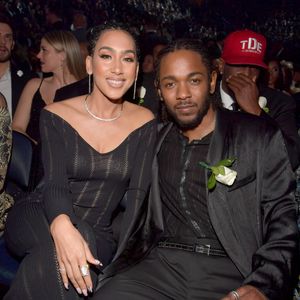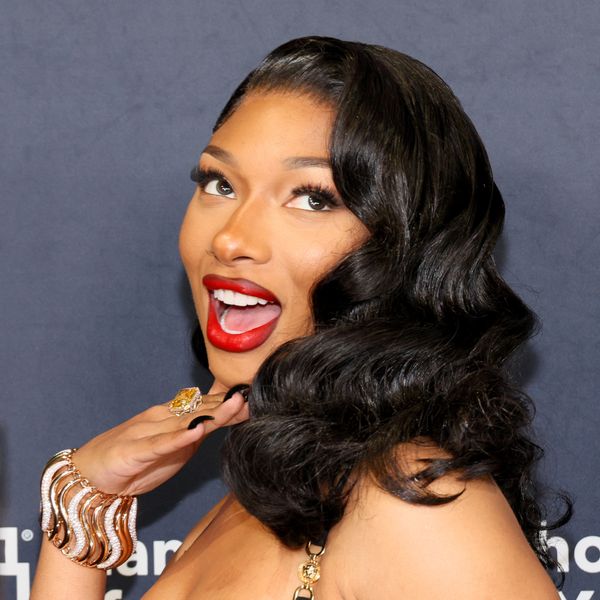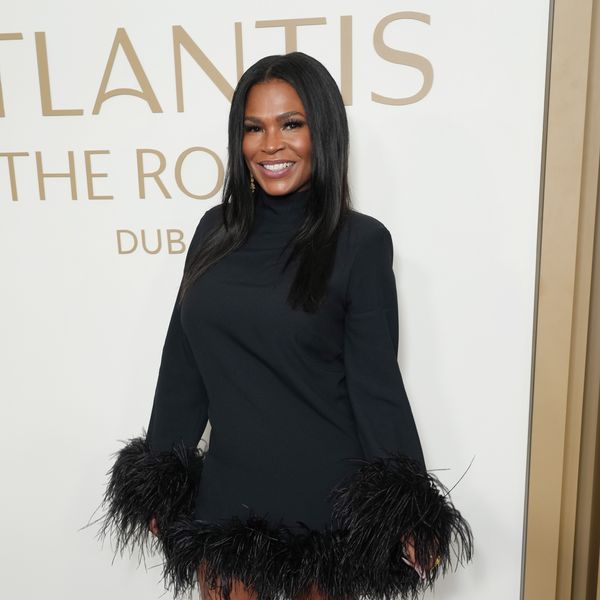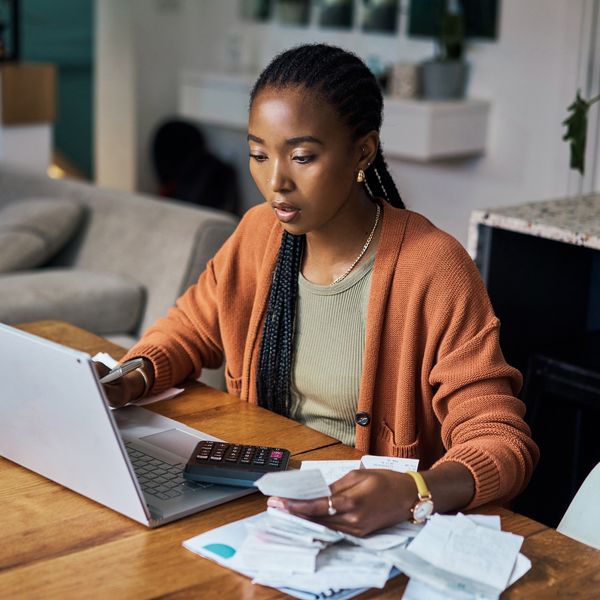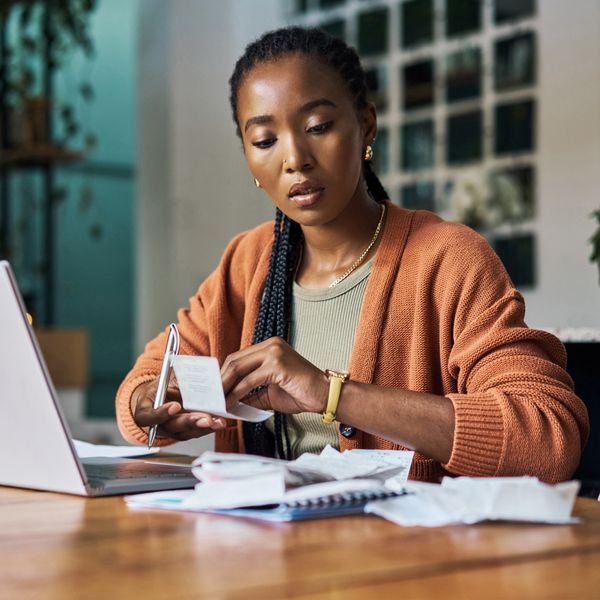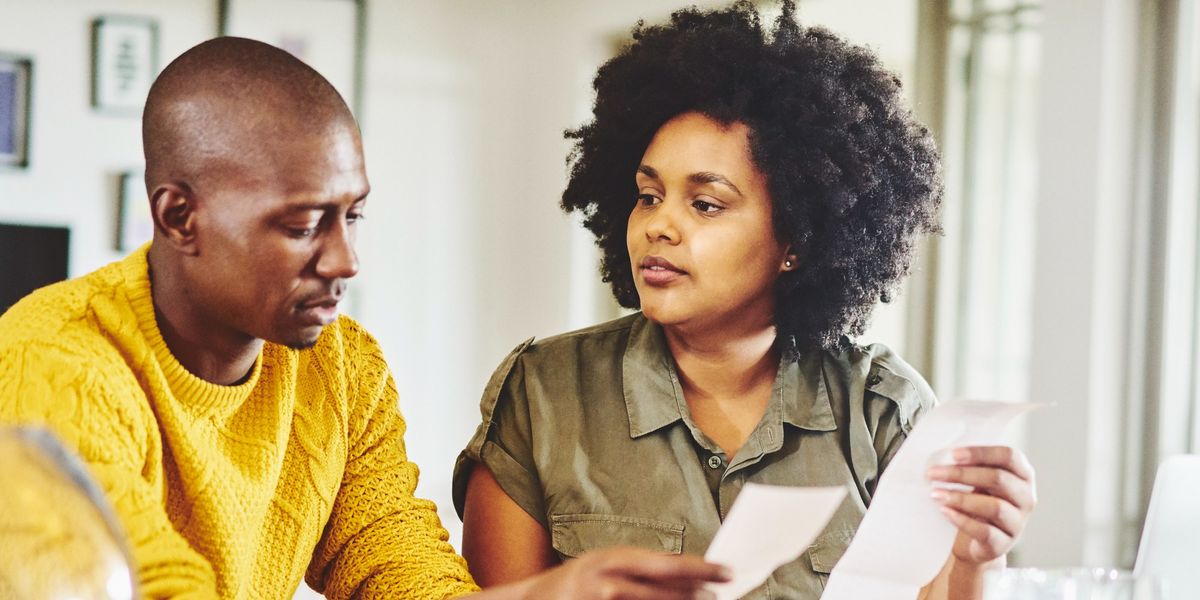
Breadwinner Politics: What To Do When You Earn More Than Bae
While Black women still face the issue of unequal pay and systemic challenges to upward mobility, there’s still apparently a pretty significant number of us who are making more than our significant others. A 2023 Pew Research report found that Black wives are “more likely than wives from other racial or ethnic groups” to be the breadwinner in their marriage. Almost one in four Black wives (26%) out-earn their husbands.
Black women are also more likely to earn college degrees than their Black male counterparts, making the earnings gap even more of a reality whether you're married or not.
If you’re dating and your salary is higher than your partner’s, it can seem awkward or downright scary to talk about money with them. And as a woman earning more than her partner (or who has the potential to more than likely out-earn a love interest), you might be tempted to go all in with questions and investigations related to investments, car choice, child support cases, and credit score on the first date.
But before you do that, pause and think about this: Why ask about credit scores and salaries on a first, second, or even 100th date when you don't even know if that person has integrity, values that align with yours or isn't out here trying to make you the next Reesa Teesa?)
How To Have The Money Conversation As The Breadwinner
I’ve been in several relationships where I earned more than my man, and while it’s not something I’m ashamed of, that gap did have its implications. For me, if the man was treating me with respect, love, and attention, I really didn’t care that he might be taking home less pay. The tragic part of that would be when some of the guys I'd dated saw me spending money on designer bags, going out to eat more than three times a week, or taking trips, there would be issues of passive-aggressive judgment, resentment, and eventually relationship sabotage. (I’ve also dated men who earn six figures and above, but that’s a whole other story.)
Sometimes we become the breadwinners due to circumstances that are beyond someone's control or due to a life transition. Maybe your spouse was laid off from the job two years into the relationship or marriage, or they had to take on the care expenses for an elderly parent. Maybe they're in the throws of launching a new business or pursuing higher education, or the person was hit with a lawsuit, health scare, unforeseen tax bill, or other financial emergency. So it's not always an issue of fault, fraud, or scandal, and can be more of a case of life life-ing.

Georgijevic/Getty Images
All relationship dynamics are different, so what one woman sees as a red flag might not be a huge deal-breaker for others. I’m super-ambitious and self-employed, have found long-term success in a media industry perfect for independent go-getters, and I’ve always embraced having a side hustle.
Considering what many Black men face in society in general, I could understand and accept the possibility that my ideal mate might earn less money than me.
In my current relationship, ongoing for seven years, the breadwinner status has shifted multiple times, and for the most part, my man is my man. Period. After getting through some very tough times including surviving a whole pandemic, healing from surgeries, and coping with deaths in our families, there are things beyond money that have become golden for me in my love and loyalty toward him.
Whether you're married or you've been in a relationship for the long haul, here are a few helpful tips I’ve learned along my journey as well as what the experts say about it:
1. Use fun and humor to spark the money conversation.
I've always been one to shy away from talking about money with anyone, as that's just not something we did when I was growing up. For the most part, I saw the men in our family, whether they were the breadwinner or not, taking charge of the spending in the household and they oftentimes paid for everything, even if, for some, the bulk of the money was earned by their wives. It seemed to be an unspoken rule that everyone must have the perception that the man was calling all the shots financially (when I'd later find out, that one man in the family, for example, was often unemployed.) I only learned through observing things, not through conversations for clarity, confirmation, or understanding.
So when I started working and dating seriously, I'd just avoid speaking up when men would love-bomb me after seeing how I dressed, or when I'd find out that a guy who had spent $200 on a first date was actually struggling—making $1200 a month before taxes—and was just trying to impress me.
Today, humor and fun are helpful in having conversations about money. Early in our relationship, my man and I would play a game and ask questions of each other about how much we'd spend on a house or what we would do if we had $1 million. We might find humor in the money mistakes we've made in the past and those conversations would often lead to very serious conversations about debt, current bills, quality of life standards, and how we can work together to help one another achieve our respective goals.
Leaning into humor has helped me have those hard conversations—to get to know my partner more—and they've allowed him to feel a bit more comfortable about sharing information about his finances with me. One expert agrees that adding humor to conversations about money can be beneficial. “I think that keeping it light is the best way to learn. If we lower the temperature, if we make it fun, if I tell you how I have screwed up everything and I still did okay, that we can all come out of this much, much better, we'll relax and do a better job with our money,” Joe Saul-Sehy, co-host of NerdWallet's Smart Money Podcast, shared during an episode.
2. Put mutual respect and consideration at the center and approach with grace and love.
Bola Sokunbi, founder of CleverGirl Finance, breaks this down very well in sharing her own experience with being the breadwinner in a relationship. “Just because you earn more doesn't mean you should become the evil queen dictating how every penny is spent, checking all the bank accounts, and asking for a play-by-play of every transaction your partner made,” she writes. “Think of how you would want to be treated if the roles were reversed. Allow your partner to make financial decisions; remember you are part of a team, and it is a partnership.”
While you should feel no shame or guilt for your success as the breadwinner, there's still a way to talk about money with your spouse that does not demean or belittle them. And you need to be clear about your own financial blind spots, habits, and mindset in order to come correct in a conversation about money with someone else.
Just because you're the breadwinner doesn't mean you're great at managing money or have the best personal finance habits, so consider humility and decency when talking with your partner about their own. (I can admit that I've dated men who made less but treated their money better than I did. Several were even better at managing what they had and building savings versus always living check to check, which was my reality at certain times in my life.)
Whatever your desires are when it comes to money and its role in your relationship, approach the conversation with respect, grace, love, and consideration that you’re talking to someone you care a lot about. Figure out what you're willing to compromise on and what you're not, and go from there.

skynesher/Getty Images
3. Instead of pausing, tip-toeing or avoiding, address behaviors that reflect habits and values.
Timing is a sticky aspect when you're talking about finances with your partner or spouse, whether you're in a long-term relationship, in the early stages of a romance, or you've already walked down the alter. From my own experience, being strategic in talking early on about what matters to me, in general, is key. And using my own senses of observation and gut feelings is important, too.
"'Fess up about the debt too soon and you risk scaring that special someone away, " Kimberly Foss, a certified financial planner, told Forbes. "However, if you wait too long, it can complicate things. If you are becoming very serious in your relationship, it is time to speak up. [If you carry a lot of debt], think of the roles being reversed — wouldn’t you want to know? You might be surprised just how understanding and open your partner is."
At the end of it all, it's not really about the money but about compatibility in one's outlook on what success means, what trust entails, what quality of life they want, and how they see partnership in a relationship. A few observations I think are more telling than outright asking a man about his credit score would be to watch early on for signs of greed, jealousy, uncontrollable anger, indifferent complacency, scarcity mindset, and ego.
Experts also recommend that married couples should especially embrace open communication to come up with a plan of action that they both can agree on. If you're expected to carry the financial load at any time in the relationship, set healthy boundaries and hold your partner accountable. You can also get help in the form of a therapist, counselor, or financial adviser to create or adjust the plan and help you navigate through bumps in the road without heading to TikTok for a 50-part series or, worse, divorce court.
Let’s make things inbox official! Sign up for the xoNecole newsletter for daily love, wellness, career, and exclusive content delivered straight to your inbox.
Featured image Stígur Már Karlsson /Heimsmyndir/Getty Images
- Ever Wonder If Your Man Is Actually Holding You Back In Life? ›
- Why Black Women Are Choosing Careers Over Marriage ›
- Are You The Financial Supporter Of Your Husband's Dreams? This Is For You. ›
These Newlyweds Found Love Thanks To A Friend Playing Matchmaker
How We Met is a series where xoNecole talks love and relationships with real-life couples. We learn how they met, how like turned into love, and how they make their love work.
Jason and Elise Robinson’s union is a reminder that kind people still get their happily ever after. The pair had their first date in October of 2021 and tied the knot on June 15, 2024. Both of them have dedicated their lives to celebrating and supporting Black culture so it was only fitting they get married in what's considered the Black Hollywood of America during the Juneteenth celebration weekend. From the florists to Elise and Jason's gown and suit designers to the table signage and so much more, everything was Black-owned. It's no wonder their love for Black culture was the jumping-off point for their love story.
When they met, Jason had just moved to Atlanta for a new job opportunity, and Elise was living happily in her career and had put dating on the backburner. But luckily, a mutual connection saw something in both of them and thanks to a yoga-themed baby shower and a chance text message, they found their forever. Check out their beautiful How We Met story below.
I’ll start with the easiest question. Can you both tell me a little bit about yourself and your background?
Elise: Sure, my name is Elise. I’m actually from Atlanta, GA – not a transplant. I grew up here and left right after college to pursue my career. Now I’ve been back going on eight years, and I’m in my early 40s.
Jason: And I’m Jason. I’m originally from Racine, Wisconsin. I went to school at Florida A&M University, so I am a rattler. I went back to the Midwest for a period of time, in Indianapolis. Now, I’ve been in the Atlanta area for a little over two and a half years.

Jason and Elise Robinson
Photo by FotosbyFola
Wow, that’s nice because Atlanta gets a bad rap when it comes to relationships. So you have to give us the deets. How did you two find each other?
Elise: So I work in TV and I was on-air for a number of years and then transitioned into being a producer and then a manager. As a producer, I’d always have guests on. And there was a woman who came on frequently named Rosalynn (@Rosalynndaniels, often referred to as The Black Martha Stewart), and we connected instantly. Anyway, she got pregnant right before COVID and invited me to a “modern-day yoga baby shower.” I came to support, but was also just curious about that theme.
I had an amazing time. And when it was over a few of us stuck around and convos got personal. She ended up asking me the infamous ‘Are you dating’ question. When I told her no, she decided to set me up. So I should tell you, in both of my only two serious relationships, I was set up – so I was like no.
But she pointed at her husband, who was folding up chairs, and said that another friend set her up with him. Sometimes, it takes people outside of us to see what we need. A few months later, she reached out and said she had family relocating and thought I’d really like him. So she gave him my number, and I reached out with a text. He responded with a call, and that night, we talked for about 2-3 hours. So that’s how we met. I was a little nervous because me and Rosalynn were starting a friendship, and here I was, talking to her family!
Jason: It was new for me too. Remember, I was new to the area, and I had heard so many “stories” about how people have been done wrong in the dating world. Whether it’s by theft or scamming (laughs). Plus, I had just got a new job and wanted to focus on that. But I did want to be able to date someone in a more personal way and see where it led. I felt like who better than someone who I trust to connect me. Rosalynn knows I’m private, about business life, and my personal life is important to me.
So let’s get into your courtship. What was your first date like?
Elise: We had our first convo on a Monday, and he asked me out the next day. I didn’t have any plans, but I still said no. I was just playing hard to get (laughs). But we were talking every day, and he told me he wanted to take me somewhere I’ve never been. And I’m like, you’re in my city! But he sends me three options, and sure enough, two of the places I hadn’t gone to. So, our first date was October 1, 2021, and somebody was 45 minutes late.
Now Jason, why were you 45 minutes late?
Elise: It was me – in my own city. I just got turned around, and the traffic was horrible. I kept calling him and giving him permission to leave. Full transparency: I probably wouldn’t have waited if the shoe was on the other foot. But this was my first sign of what I now know and love the most about him. It’s his patience. When I got there, I was frazzled and everything, but he was just super calm. It ended up being a great first date.
Jason: I remember just waiting and being concerned for her well-being. Because I know how traffic can be, especially when someone is rushing. I was just scrolling through my phone and looking through the menu. It was cool.

Elise and Jason Robinson
Courtesy
That’s beautiful. Now let’s talk about the “what are we” convo? Did you have one of those and if so, who initiated it and how was it?
Elise: I initiated it. Jason was dating me – and still does. But by this time, we had been on a number of dates. We were on our way to a winery, and we had a bit of a drive. So I decided to state my intention. We were just a few weeks in, but we were spending a lot of time together and we are people of a particular age. So I told him, I know Atlanta can be a Black man’s playground. There’s so many beautiful professional women here. But I’m dating with intention. I don’t want to kick it or hang with a good guy even though he’s not my person. I was done with all of that. So I’m “laying down the law” in my eyes, and he didn’t flinch. He let me finish and basically let me know we were on the same page. He was not trying to sow his royal oats.
Jason: Yeah, I was not trying to be Prince Akeem. But also, it was more so about setting a tone and goal for myself. My mama always told me to set my goals. And having a family was always one of mine. I think the biggest thing of it all, was I felt blessed – in terms of moving for work and meeting Elise, now being married. There’s victories being placed in my life.
I love that you both shared that because sometimes I get feedback on these stories and it seems like sometimes we’re afraid to really voice what we desire, no matter what that looks like.
Elise: Yeah, I think sometimes women feel like they don’t want to put pressure on their partner. But it’s not pressure. Look, Jason and I are based in faith, and what is for us is for us. Being upfront and honest is best – and early makes sense. You don’t have to convince someone to be your person.
Jason: I think her sharing those values resonated with me, and hearing her “lay down the law” was fine because I was there, too. I would say to millennial women, don’t be afraid to tell a mate what you want. You never know what that would lead to. Time is a precious commodity. Elise saying that early on showed me that she values both of our time. It showed her heart, character, and integrity, and I was drawn to that and the mature conversation. In the social media world, we don’t have those pointed conversations face-to-face. I would challenge readers to have those conversations in person, and you would get more from that convo than any post or reel. Because you see body language reactions and have deeper communication.
Yeah, I think sometimes women feel like they don’t want to put pressure on their partner. But it’s not pressure. Look, Jason and I are based in faith, and what is for us is for us. Being upfront and honest is best – and early makes sense. You don’t have to convince someone to be your person.
You both have mentioned time, family, and integrity. I’m curious what other core values do you both share?
Elise: Early on, our faith. Not just do you believe in God. It had to be deeper in that. I needed someone who would lead me, our home, and our family. I didn’t want to be in a push-and-pull relationship about prayer, church, or have conversations about being better people. Also, we discussed finances. That doesn’t just mean going to work. We chatted about ownership and what it looks like for us. How do we support each other individually and together? I know I like having my hands in a few different pots, and I needed someone who was supportive of that and likewise.
Jason: My background is that I was raised in the church. My father is a deacon and my mom is a deaconess. They've been married for 55 years. Faith was very important to me and it was crucial that my wife have that relationship as well.

Elise and Jason Robinson
Photo by FotosbyFola
Can we talk about challenges? Big or small, what are some things you had to grow through together?
Elise: I have never lived with anyone – not a roommate, a sister, friend, boyfriend or anything. Now, I’m in my 40s and I'm living with someone. When you’ve been by yourself for so long that was a challenge for both of us. We weren’t pulling each other's hair out but I’m a bit extreme. Things are color-coded in my closet. For me, working in news is chaotic so I want my home to be peaceful and organized.
Jason: I’m a man, and she’s a woman. That dynamic alone adds a flair to it. She wants things a certain way. She’s a Capricorn. But just in terms of how she wants to keep a home was a big adjustment for me. It took time.
On a smaller level, what are some of the things you disagree about day-to-day?
Elise: Cleanliness and systems. Like, he recycles and I do not. But sometimes I just have to decide if it really needs to be a thing or if I can just take care of it.
Jason: This is where my organization takes over (laughs).
What are your love languages? Do you know?
Elise: Jason’s is an act of service which works because I love cooking for him. It doesn’t feel like a chore to me. I love when I’m out, picking up his favorite juice. The other day I saw he needed t-shirts while folding clothes. So I just like doing small things for him that he doesn’t expect. He’s very much that guy that will ask to help so it doesn’t bother me.
Jason: I’d say Elise is all of them, but physical touch would probably be the biggest one. I had to get used to that. She’s taught me it in a number of ways. I remember we actually talked about love languages, and I sent her this song called “More Than Words” by Extreme. That explained to her how I felt.
Finally, can we end with the proposal? Tell us everything!
Jason: It was at a restaurant. And again, I was trying to find somewhere she hadn’t been. Also, I didn’t want to do it on our anniversary because that would have been too obvious. I contacted one of the restaurant’s staff and decided to change up the dessert menu. Each item was something special to us.
Elise: We go on so many date nights, so I just thought it was a regular night. We had finished eating, and I had to go to the bathroom. They had a nice mirror, girl. So I’m in there taking videos and stuff.
Jason: While she’s in the restroom, I’m getting everything in place with the waitress.
Elise: So as I’m reading the menu, I realize it’s telling our story and he eventually proposed. It was so special; I actually had the menu framed! It was so beautiful and thoughtful.
Let’s make things inbox official! Sign up for the xoNecole newsletter for love, wellness, career, and exclusive content delivered straight to your inbox.
Feature image by FotosbyFola
Sexual compatibility is one of the more spicier sides to Astrology that most people haven’t heard of. These are the details you get to once you have learned about your “Big 3” (sun, moon, and rising sign), and want to dive deeper into what Astrology can really tell you about yourself. Why not have more of an understanding of your sexual chemistry with others and what excites you in bed? Astrology not only gives you a blueprint of what your best match is in love, professionally and platonically, but it also provides insight into who you are most sexually compatible with.
When discovering more aspects of yourself through the stars, you don’t want to overlook the power of this celestial study when it comes to the bedroom.
There are a few key components you want to look at when it comes to sexual compatibility in Astrology. Your traditional sun and moon sign first and foremost, as this simple aspect can tell you a lot about who you are, your emotions, and your needs; Mars, the planet that rules sex in Astrology; Venus, the planet that rules love in Astrology; the 8th house, the astrological house that rules sex, sexuality, and sensuality; the 5th house, the astrological house that rules romance, flirtation, and sex. And lastly, you can also look at where Scorpio is in your birth chart, the sign that rules the reproductive system.
Read below to see who you're best sexually compatible with. (Read for your sun, moon, Mars, and Venus signs.)
ARIES
Like all fire signs, Aries needs a lot of heat in the bedroom. Aries are ruled by Mars, the planet of sex, passion, and energy, so you can be sure that this sign has a high sex drive. Aries love the spontaneity of sex, and they have a lot of fun in this area of life. Sexual compatibility is high with fellow fire signs, Leo and Sagittarius, and the same element makes the best match for an Aries overall. They want someone who is going to be just as intense and exciting in the bedroom, and they find that with Leo and Sagittarius.
Scorpios also make good matches for Aries being that they are sitting in Aries’ 8th house of sexuality. A dynamic duo like Aries and Scorpio brings not just the heat, but also an emotional connection as well.
Best sexual compatibility with Leo, Libra, Sagittarius, Aquarius, and Scorpio.
TAURUS
Taurus are no strangers to the bedroom. This is a very sensual sign whose love language is physical touch (and gift-giving). They love to feel wanted and needed in the bedroom and prefer for the atmosphere to be set with candles, roses, and chocolates. This is a sign that take their time in bed, and they want both parties to feel good first and foremost. One of the best matches for Taurus, sexually is their opposite sign, Scorpio. These two bring together earth and water and create a good balance in bed.
Leos and Taurus are often drawn to each other, and there is an underlying sexual tension between these two. Virgos are also high on the scale of compatibility with Taurus, and they have a sexual chemistry that is comfortable and sincere, which is what Taurus is looking for.
Best sexual compatibility with Scorpio, Virgo, Cancer, Leo, and Sagittarius.
GEMINI
Gemini is a wildcard in the bedroom. No two Geminis are the same, and this is true when it comes to sexual chemistry. However, there are a few key components Geminis look for when it comes to sex. They want to be with someone who is completely and authentically themselves and someone who isn’t shy in the bedroom. They do well with Sagittariuses as they can match each other’s freaks. However, they also have a unique chemistry with Capricorns, who are in their 8th house of sensuality. Capricorns and Geminis are like two different people, teaching each other something new, and they have a lot of fun. One of the best matches for Gemini overall, though, would be another air sign, Aquarius.
Best sexual compatibility with Libra, Aquarius, Sagittarius, Aries, and Capricorn.
CANCER
Cancer is the type to keep their love life and sexual world hidden or more secret than most. They don’t let others in easily, and deeply value keeping this part of their life hidden or sacred. They look for partners who are devoted to them or are showing this type of dedication and attraction to them in the bed. They have amazing chemistry with other water signs, Pisces, and Scorpio, and often form intense and emotional bonds with these signs in bed. They also love to show off their wild side with signs like Aquarius and Virgo, as they see these intellectuals as people needing to let loose and get into their emotions more, and they want to be the one to help them do that.
Capricorns are one of the best matches for Cancer overall because they won’t rush anything and will be able to form a deep connection with Cancer first and foremost, which would make their sexual chemistry off the charts.
Best sexual compatibility with Pisces, Capricorn, Scorpio, Virgo, and Aquarius.
LEO
Leos are more traditional in the bedroom than most people expect. Like all fire signs, they have a passion and self-confidence that is undeniable, but in the bedroom, they want to be treated like the royalty they are. Leos love to be courted or to be shown how adored and admired they are. They go well with Geminis because of this, as this air sign is often a talker in bed, and will never miss an opportunity to whisper something sweet in their ear. Leos also have a soft spot for Pisces in the bedroom, and this water sign tends to bring out a more kinky and sensual side to Leo.
One of the best sexual matches for Leo overall would be Sagittarius, who Leo feels is someone who can truly match their energy.
Best sexual compatibility with Leo, Sagittarius, Aquarius, Gemini, and Pisces.
VIRGO
Virgos are the definition of a lady in the streets and a freak in the sheets. Being represented by the Virgin or the Maiden in Astrology, people often have Virgos sexuality misconstrued. Their typical organized self goes out the window when they are comfortable with someone sexually, and their service-oriented attitude makes them some of the best lovers in bed. Virgos have a sincere and compatible connection with other earth signs, Taurus and Capricorn. Earth signs have a way of making everything feel better, and there is a lot of touching between these signs.
Cancers also have great sexual compatibility with Virgos, as they have similar styles and needs in the bedroom. Virgos have instant sexual compatibility with Scorpios, and this is a very common combo you see in life.
Best sexual compatibility with Scorpio, Taurus, Capricorn, Cancer, and Aries.
LIBRA
Opposites attract when it comes to Libra in the bedroom. This sign is always looking for balance, and they find that with a partner who brings something different to the table than they do. This makes their opposite sign, Aries, the sign that rules their 5th house of romance and flirtation, one of their best matches when it comes to sexual compatibility. Libra loves foreplay. They enjoy dressing up, role-playing, and a lot of talking in the bedroom, which makes Gemini and Aquarius another great match for Libra, because they also don’t keep quiet in bed.
Taurus has one of the best sexual compatibility for Libra, overall, however, as they are both ruled by Venus, the planet of love. These two quite literally have the capacity to not just have sex, but make love to one another, which is the most ideal for Libra.
Best sexual compatibility with Leo, Aries, Aquarius, Taurus, and Gemini.
SCORPIO
Scorpios are known for their reputation in the bedroom. When people think of Scorpio, they often think of sexy energy, and this is because Scorpio quite literally rules the reproductive system and the 8th house of sex in Astrology. They are no strangers in the bedroom, and they are people who know what they want. Scorpio and Pisces often have an instant connection, and these two are usually rushing into bed with one another.
Another sign that surprisingly flows well with Scorpio in bed is Geminis, who provide Scorpio with a non-judgmental atmosphere that makes them feel in tune and sexy. Scorpio has high sexual compatibility with earth signs: Virgo, Capricorn, and Taurus, as they show Scorpio a more sensual and grounded approach that is enticing to them.
Best sexual compatibility with Pisces, Virgo, Capricorn, Gemini, and Taurus.
SAGITTARIUS
Sagittariuses aren’t the pickiest in the bedroom and just like they can get along with anyone if they want to, the same fact applies in bed. They are looking for a more immediate and instant attraction than anything; however, just because you got them once doesn’t mean you can get them again. Sagittarius are wanderers, and they are constantly seeking new stimulation. This is why they have such strong sexual chemistry with Aries, who are also more spontaneous in the bedroom.
They are very flirtatious and want things to be fun and light-hearted here, and they find that chemistry with Aries. Sagittarius also has a soft spot for Cancers in bed, and they let out their more sincere, compassionate, and deep side for this water sign.
Best sexual compatibility with Libra, Aries, Sagittarius, Aquarius, and Cancer.
CAPRICORN
If you can get Capricorn to take their mind off work and focus on intimacy in the bedroom, then you are already a great match for this logical sign. They don’t open up to many people, and some Capricorns can approach sex as a duty rather than a desire or a connection. This is why this sign does so well with water signs in bed like Cancer, Pisces, and Scorpio because these are people who know how to let go of the mind and live in their emotions for a while.
Capricorns also have strong sexual compatibility with Taurus and Leo because there is a sense of dominance imbalance here that is sexy to Capricorn. Leo and Capricorn both want to take the lead in bed, and they have fun playing around with each other and teasing.
Best sexual compatibility with Taurus, Cancer, Scorpio, Pisces, and Leo.
AQUARIUS
Aquarius is a more sexually inclined individual than most people would assume. They are known for their mind, intelligence, and eccentricity, but this doesn’t mean they don’t have the same amount of intelligence and knowledge when it comes to sex. Aquarius are very intuitive in the bedroom, which makes their compatibility with Virgo so strong here. These two know what each other needs without saying anything, and they have a lot to bring to the table.
Gemini, on the other hand, brings out a wild side to Aquarius, and they have a lot of fun in bed and even more to talk about afterwards. Aquarius has one of the best sexual compatibility with Aries, as they can open up to each other about their weird kinks or needs in bed in a judgment-free zone.
Best sexual compatibility with Aries, Gemini, Libra, Leo, and Virgo.
PISCES
Pisces are more fluid and open in the bedroom. Their sexual compatibility deals with emotions first and foremost, and they look for an emotional connection in their partners, no matter how long or short they have known them. They are one of the signs who doesn’t really have a “type,” and they are most attracted to generally nice and romantic people. Earth signs Taurus and Virgo have great sexual chemistry with Pisces, as there is a good give-and-take between them. Scorpios bring out Pisces' freakier side, and the imagination of these two definitely shows in the bedroom.
Pisces' best match sexually would be Cancer, as these two have a more erotic and romantic type of connection here. They are slow lovers and have such a strong bond sexually because of the emotional compatibility they have as well.
Best sexual compatibility with Cancer, Scorpio, Virgo, Taurus, and Libra.
Let’s make things inbox official! Sign up for the xoNecole newsletter for love, wellness, career, and exclusive content delivered straight to your inbox.
Featured image by LightFieldStudios/Getty Images

